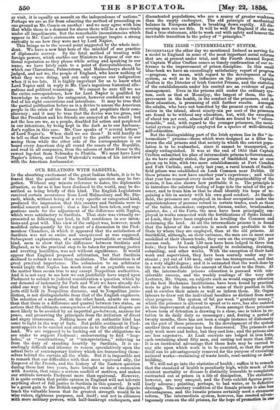OUR RELATIONS WITH SARDINIA.
De the absorbing excitement of the great Indian debate, it is to be feared that the position of the Sardinian question may be for- gotten. Without any minute reference to dates, the diplomatic situation, so far as it has been disclosed to the world, may be de- scribed as being briefly of this kind. The English Legislature received certain assurances from Lord Ma] mesbury and Mr. Dis- raeli, which, without being of a very specific or categorical kind, produced the impression that this country and Sardinia were in cordial concert and accord : that a line had been taken, and sug- gestions made for the adjustment of the difference with Naples, which were satisfactory to Sardinia. That state was virtually re- presented as following our lead, in full confidence in our inten- tions and good will. This view of the subject was, however, much modified subsequently by the report of a discussion in the Pied- nzontese Chambers, in which it appeared that the satisfaction of Sardinia was not so entire and unequivocal as was supposed. Subsequent explanations, of a somewhat journalistic or unofficial kind, seem to show that the difference between Sardinia and England, as to the practical step to be taken for procuring justice and averting hostilities, was not without significance. It would appear that England proposed arbitration, but that Sardinia declined to submit to more than mediation. The distinction is of great practical importance. The submission to an arbitrator would imply that Naples has much more of an arguable case in the matter than seems true to any except Neapolitan authorities. And it is not easy to see how we can justifiably have urged upon Piedmont to submit to judicial consideration a question which by our demand of indemnity for Park and Watt we have already de- cided one way : it being clear that the case of the Sardinian sub- jects still held in Neapolitan durance, and to Neapolitan juris- diction, is not distinguishable from that of the English engineers. The selection of a mediator, on the other hand, admits no more than that there is a difference and quarrel between two states, so serious that the ultimate consequences of international dispute are most likely to be avoided by an impartial go-between, anxious for peace, and preserving the principals from the irritation of direct and angry intercourse. Nothing more of an authentic kind has come to light in the way of facts. But public sentiment in Pied- mont appears to be excited and anxious as to the attitude of Eng- land. We are supposed to be backing out of the obligations we are under to support Piedmont; endeavouring to find "loop- holes," or "constructions," or "interpretations," relieving us from the duty of standing heartily by Sardinia. It is ex- ceedingly difficult and irksome to reason speculatively upon the actual facts of contemporary history which are transacting them- selves behind the curtain all the while. But it is impossible not to remark that our difficulties with that most equivocal ally, the Emperor of the French, and the history of the Eastern question during theme last two years, have brought us into a connexion with Austria, that raises a serious conflict of motives, and makes our attitude towards Piedmont more than equivocal. However, it is quite certain that public opinion in England will not tolerate anything short of full justice to Sardinia in this quarrel. It will be a great gain to the British empire, if the events of the dispute teach the valuable lesson that its greatest strength would be in wise rulers, righteous purposes, and itself; and not in alliances with mere military powers, with half-bankrupt exchequers, and
discontented populations, who are a source of greater weaknese than the empty exchequer. The old principle of mechanical balance in European affairs is breaking down rapidly. All dis- oerning men can see this. It will be well for England if she can find a true statesman, able to work out with safety and honour the inevitable transition to the policy of "principles.'


























 Previous page
Previous page